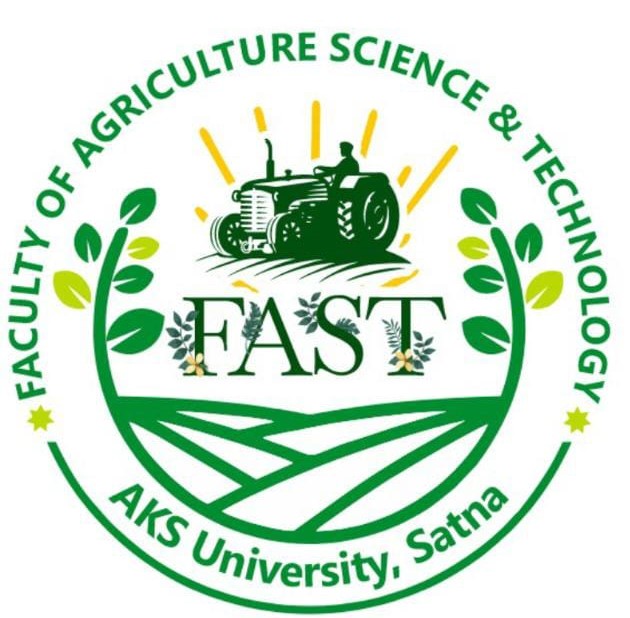Agriculture Engineering & Food Technology
About the Department
Vision
Mission
HOD's Desk
Graduate Attributes (GA)
About the Department
Overview of the Department
The Department of Agriculture Engineering & Food Technology at AKS University, Satna
focuses on quality education, practical training, and industry exposure. Its curriculum blends
theoretical learning with hands-on experience in new age agri-tech and food engineering. Strong
industry linkages enhance leadership and skill development among students. The institute offers
cutting-edge laboratories and infrastructure for precision agriculture and renewable energy.
Students receive holistic development through extra-curricular activities like NCC, NSS, and
sports. Experienced and qualified teaching faculties nurture students to meet future challenges in
food and agri-development. Graduates are prepared to contribute as innovative professionals in
agriculture and food industries.
Salient Features of the Department
- Adequate Resourceful Infrastructure.
-
ICAR Dean’s Committee recommended Syllabus
All the programmes of the department are fully aligned with and implemented as per the guidelines and principles of the National Education Policy 2020 (NEP 2020)
-
Well Refined & Transparent Examination System.
- Well Qualified, and Energetic Young Teachers under the guidance of Highly Qualified Experienced Persons.
- Unique, Effective and Efficient ICT based teaching-learning infrastructure. Safe, Clean & Peaceful Learning environment.
Vision
Vision
“To conduct its key programme and activities in a unique manner that promotes excellence and
leadership in education, research, innovation in Food and Agricultural Technology and fosters an
environment that is safe, highly productive and dedicated to continual improvement.”

Mission
Mission
- Enable students to seek fulfilling careers in agriculture and food based industries, research or as entrepreneurs.
- Empower department to have impact on society for the contribution and achievement.
- Create teaching and learning models with a collaborative platform which could be emulated by other institutions.
- Be recognized in agriculture sector; improve farmers, industries and agriculture allied sectors.
HOD's Desk
Dr. Ajeet Sarathe
Ph.D. in Agriculture Engineering, MGCGV, Chitrakoot
M.Tech. in Post Harvest Process & Food Engineering, JNKVV, Jabalpur
Head of the Department Department of Agriculture Engineering and Food TechnologyAKS University, Satna (M.P.) India – 485001

Message
The Department of Agriculture Engineering and Food Technology is committed to equipping
students with high-quality education and industry-relevant skills. Recognizing the evolving
demands of engineering and technology, the department emphasizes enhancing students’
employability through specialized training and career-oriented programs.
The Training & Placement Cell plays a vital role by providing up-to-date information on employment opportunities, higher education, fellowships, and competitive exams such as Civil Services.
Regular capsule courses, career bulletins, and self-employment guidance are also offered. Strong industry-university linkages facilitate campus interviews, enabling students to secure placements in food processing, agricultural machinery, irrigation, and other agro-based industries.
Many graduates have successfully joined prestigious public and private sector organizations across India, including various government departments.
The university actively engages with over 100 companies, ensuring ongoing interaction between students and industry professionals. With its focused academic and career development approach, the department nurtures capable graduates ready to contribute meaningfully to their chosen fields.
The Training & Placement Cell plays a vital role by providing up-to-date information on employment opportunities, higher education, fellowships, and competitive exams such as Civil Services.
Regular capsule courses, career bulletins, and self-employment guidance are also offered. Strong industry-university linkages facilitate campus interviews, enabling students to secure placements in food processing, agricultural machinery, irrigation, and other agro-based industries.
Many graduates have successfully joined prestigious public and private sector organizations across India, including various government departments.
The university actively engages with over 100 companies, ensuring ongoing interaction between students and industry professionals. With its focused academic and career development approach, the department nurtures capable graduates ready to contribute meaningfully to their chosen fields.
Graduate Attributes (GA)
Graduate Attributes (GA)
Graduate Attribute
Graduates of the B.Tech. programme in Agricultural Engineering and Food Technology will
possess the following attributes:
1. Engineering Knowledge Proficiently apply mathematics, science, and engineering principles to solve complex problems in agriculture and food technology.
2. Problem Analysis Critically analyze and interpret complex engineering challenges using scientific literature and foundational knowledge to develop informed conclusions.
3. Design and Development of Solutions Design innovative and sustainable solutions and systems with consideration for health, safety, societal, and environmental needs.
4. Investigative Skills Employ modern research methodologies to conduct experiments, analyze data, and draw valid conclusions for real-world agricultural engineering problems.
5. Modern Tool Usage Utilize modern engineering and IT tools for simulation, analysis, and modeling, acknowledging their capabilities and limitations.
6. The Engineer and Society Apply contextual knowledge to assess societal, legal, cultural, and health-related issues, fulfilling responsibilities as an ethical professional.
7. Environment and Sustainability Understand the environmental impact of engineering practices and advocate for sustainable development in agriculture and food sectors.
8. Ethics Uphold professional ethics and responsibilities, and adhere to industry norms and regulations with integrity.
9. Individual and Team Work Operate effectively both independently and collaboratively in multidisciplinary and multicultural team environments.
10. Communication Communicate technical information clearly and effectively through reports, documentation, presentations, and interpersonal interaction.
11. Project Management and Finance Demonstrate competency in engineering and management principles to efficiently lead and execute projects across diverse domains.
12. Lifelong Learning Embrace lifelong learning with adaptability to technological advancements and evolving industry practices.
1. Engineering Knowledge Proficiently apply mathematics, science, and engineering principles to solve complex problems in agriculture and food technology.
2. Problem Analysis Critically analyze and interpret complex engineering challenges using scientific literature and foundational knowledge to develop informed conclusions.
3. Design and Development of Solutions Design innovative and sustainable solutions and systems with consideration for health, safety, societal, and environmental needs.
4. Investigative Skills Employ modern research methodologies to conduct experiments, analyze data, and draw valid conclusions for real-world agricultural engineering problems.
5. Modern Tool Usage Utilize modern engineering and IT tools for simulation, analysis, and modeling, acknowledging their capabilities and limitations.
6. The Engineer and Society Apply contextual knowledge to assess societal, legal, cultural, and health-related issues, fulfilling responsibilities as an ethical professional.
7. Environment and Sustainability Understand the environmental impact of engineering practices and advocate for sustainable development in agriculture and food sectors.
8. Ethics Uphold professional ethics and responsibilities, and adhere to industry norms and regulations with integrity.
9. Individual and Team Work Operate effectively both independently and collaboratively in multidisciplinary and multicultural team environments.
10. Communication Communicate technical information clearly and effectively through reports, documentation, presentations, and interpersonal interaction.
11. Project Management and Finance Demonstrate competency in engineering and management principles to efficiently lead and execute projects across diverse domains.
12. Lifelong Learning Embrace lifelong learning with adaptability to technological advancements and evolving industry practices.

